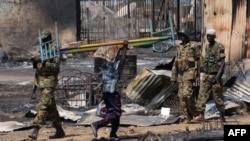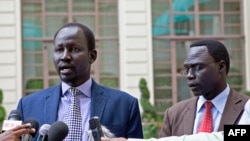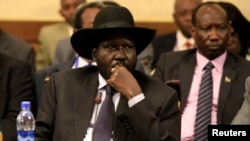JUBA —
South Sudan army officials and opposition forces on Wednesday accused each other of violating a ceasefire agreement signed five days ago by President Salva Kiir and his former deputy, Riek Machar.
Army spokesman Philip Aguer said rebel forces launched attacks outside the Unity state capital, Bentiu, and in remote parts of Jonglei and Upper Nile states, but insisted that government forces would continue to respect the cessation of hostilities agreement signed in Addis Ababa.
“We will continue to be strictly abiding by the peace agreement, but we will not allow this ceasefire to be used by rebels to continue moving, continue attacking our positions," Aguer said.
Fighting has raged in hot spots of South Sudan for at least three days since Kiir and Machar signed the new cessation of hostilities agreement, both sides have said.
Opposition military spokesman Lul Ruai Koang accused government forces of launching the latest attacks, and then trying to pin the blame for them on the rebels.
“I think they are just quick to accuse us," he said.
"Whenever they launch an attack, they will be the first to run to South Sudan TV to accuse us, because they have that propaganda machine at their disposal,” he said.
The new round of fighting came days after separate visits to South Sudan by U.S. Secretary of State John Kerry and U.N. Secretary General Ban Ki-moon. Both men have called for an end to fighting now in its sixth month.
Koang said he would welcome the deployment of more ceasefire monitors around the country.
Monitoring teams were set up under the auspices of the Intergovernmental Authority on Development (IGAD), which has been mediating South Sudanpeace talks since January. Monitors were deployed last month in Bentiu, Bor in Jonglei state, and Malakal in Upper Nile.
IGAD plans to deploy more monitors to Nassir, in oil-rich Upper Nile state, and in Akobo in Jonglei state, where an attack in December on a U.N. base left at least 30 civilians and two Indian peacekeepers dead.
IGAD officials have said they want to have troops in place to protect the civilian ceasefire monitoring teams before more monitors are deployed.
Heads of state of the regional bloc approved the deployment of a protection force in March. IGAD had to call again, more than a month later, for regional countries to contribute to the force and deploy it quickly as fighting continued in South Sudan.
Both the opposition and government sides said they are working to create humanitarian corridors so that aid groups can reach people trapped in combat zones. They did not say when theose corridors are likely to open.
Thousands have been killed and more than a million people have been forced to flee their homes by months of fighting that began as a political row between Kiir and Machar but quickly took on ethnic overtones.
Both sides have been accused of committing gross human rights violations during the fighting. The United States has imposed sanctions on two military leaders, one loyal to Kiir and the other to Machar, in a so-far unsuccessful bid to pressure the two sides to stop fighting.
Lucy Poni contributed to this report from Nairobi.
Army spokesman Philip Aguer said rebel forces launched attacks outside the Unity state capital, Bentiu, and in remote parts of Jonglei and Upper Nile states, but insisted that government forces would continue to respect the cessation of hostilities agreement signed in Addis Ababa.
“We will continue to be strictly abiding by the peace agreement, but we will not allow this ceasefire to be used by rebels to continue moving, continue attacking our positions," Aguer said.
Fighting has raged in hot spots of South Sudan for at least three days since Kiir and Machar signed the new cessation of hostilities agreement, both sides have said.
Opposition military spokesman Lul Ruai Koang accused government forces of launching the latest attacks, and then trying to pin the blame for them on the rebels.
“I think they are just quick to accuse us," he said.
"Whenever they launch an attack, they will be the first to run to South Sudan TV to accuse us, because they have that propaganda machine at their disposal,” he said.
The new round of fighting came days after separate visits to South Sudan by U.S. Secretary of State John Kerry and U.N. Secretary General Ban Ki-moon. Both men have called for an end to fighting now in its sixth month.
Koang said he would welcome the deployment of more ceasefire monitors around the country.
Monitoring teams were set up under the auspices of the Intergovernmental Authority on Development (IGAD), which has been mediating South Sudanpeace talks since January. Monitors were deployed last month in Bentiu, Bor in Jonglei state, and Malakal in Upper Nile.
IGAD plans to deploy more monitors to Nassir, in oil-rich Upper Nile state, and in Akobo in Jonglei state, where an attack in December on a U.N. base left at least 30 civilians and two Indian peacekeepers dead.
IGAD officials have said they want to have troops in place to protect the civilian ceasefire monitoring teams before more monitors are deployed.
Heads of state of the regional bloc approved the deployment of a protection force in March. IGAD had to call again, more than a month later, for regional countries to contribute to the force and deploy it quickly as fighting continued in South Sudan.
Both the opposition and government sides said they are working to create humanitarian corridors so that aid groups can reach people trapped in combat zones. They did not say when theose corridors are likely to open.
Thousands have been killed and more than a million people have been forced to flee their homes by months of fighting that began as a political row between Kiir and Machar but quickly took on ethnic overtones.
Both sides have been accused of committing gross human rights violations during the fighting. The United States has imposed sanctions on two military leaders, one loyal to Kiir and the other to Machar, in a so-far unsuccessful bid to pressure the two sides to stop fighting.
Lucy Poni contributed to this report from Nairobi.






